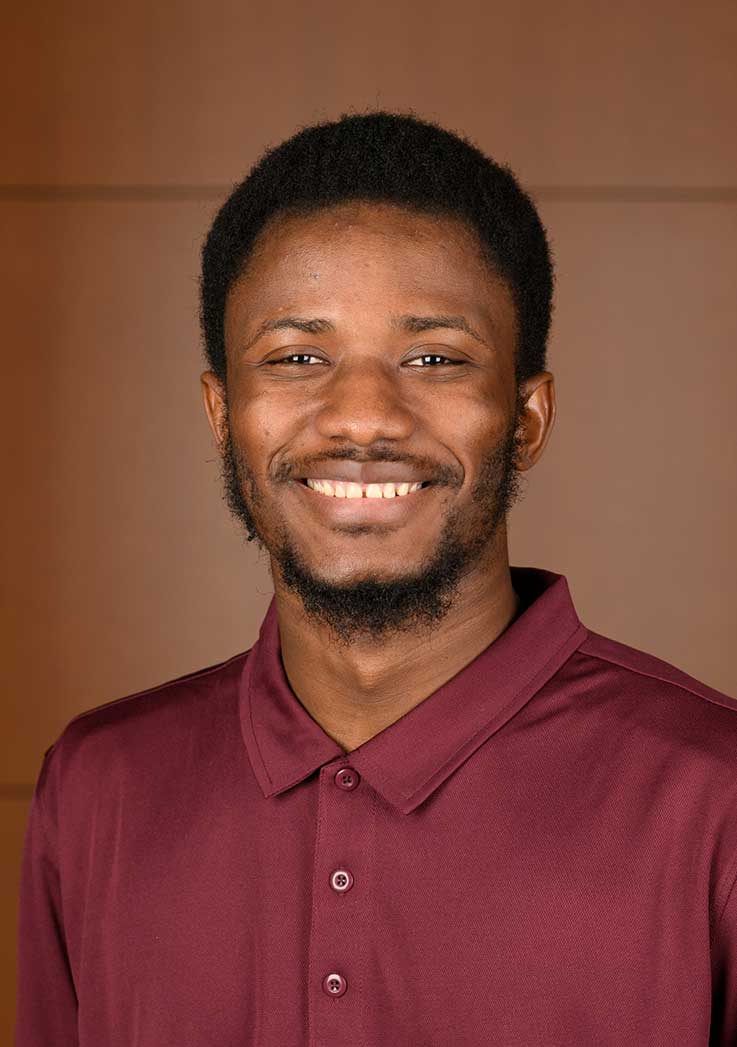 Renallan Neckles, an environmental engineering major in the Cook Honors College at Indiana University of Pennsylvania, has been selected for a National Science Foundation Graduate Research Fellowship.
Renallan Neckles, an environmental engineering major in the Cook Honors College at Indiana University of Pennsylvania, has been selected for a National Science Foundation Graduate Research Fellowship.
Neckles, who will graduate May 6 with a perfect 4.0 grade point average from IUP, will be continuing his studies through the Fellowship at Rice University in Texas, where he has been admitted into the master of science environmental engineering program.
From an applicant pool of over 12,000 students, less than 15 percent of applicants nationwide are selected for this award, which supports students working to earn a research-based masters or a PhD in a STEM (Science, Technology, Engineering, and Mathematics) field. The award provides three years of financial support within a five-year period which includes a stipend of $37,000 along with a $12,000 cost of education allowance for tuition and fees.
Prior to the NSF Fellowship, Neckles had plans to continue focusing on study in environmental engineering and working toward a PhD in the field. However, with the options now available to him through the Fellowship, he is considering moving into the field of chemical and biomolecular engineering. Following his PhD, he anticipates post-doctoral work, or possibly industry research work.
“After taking Principles of Cell and Molecular Biology with Dr. Robert Major of the Biology Department at IUP, which is a required course in the environmental engineering program, I became interested in the bio-focused aspects of environmental engineering,” he said. His ultimate goal is to contribute to ensuring the sustainable supply and protection of water through water science and technology research.
Hao Tang, a faculty member in chemistry and environmental engineering, is Neckles’ undergraduate academic advisor.
“This is a tremendous achievement that reflects his hard work, dedication, and exceptional talent in the engineering field,” Tang said. “This award is a well-deserved recognition of his potential for future success in research. I have no doubt that he will continue to excel and make contributions to the engineering field in the years to come. “
Neckles credits the Honors College requirement that its students complete an Honors Experiential Component to setting him on course for success in being selected for the NSF Fellowship.
“I decided to explore a research experience, which led me to the NSF Research Experience for Undergraduates summer program at the New Jersey Institute of Technology, where I worked in the Environmental Microbiology and Biotechnology Lab in the Department of Chemistry and Environmental Science,” he said. His research project title was “1,4-Dioxane Degrading Propanotrophs Capable of Degrading Cooccurring Inhibitory Chlorinated Solvents.”
He did this research during the summer of 2022, using molecular biological and microbial tools to determine if a certain bacterial strain can degrade dioxane (a water contaminant) and other co-occurring contaminants in the same aquatic environment.
Prior to his experience at the New Jersey Institute of Technology, Neckles completed an environmental aquatic chemistry lab project at IUP studying swimming pool water quality. His term paper, which was the ultimate deliverable for the project, was selected as a model paper, and he was one of those, along with two of his colleagues from the course, invited to present his work at the Environmental Engineering Program Advisory Board meeting in the fall of 2021.
Since the beginning of the 2022–23 academic year, he has been an undergraduate research assistant with Andrada Maicaneanu, a chemistry faculty member who is part of the Environmental Engineering program. His research in her lab has been focused on the synthesis of metal-doped carbon xerogels, which has as its goal to remove dyes from wastewater.
Neckles believes that his journey to IUP, and to the NSF Fellowship, is due to divine providence.
He began his higher education studies in 2015 at the University of Liberia and completed four years of a five-year geology program. He came to America to live with a set of his parents in 2019, transferring to Messiah University, which is relatively closer to his Glenolden home. His major there was in general engineering with an environmental engineering concentration.
When he first came to America, Neckles had applied to a number of schools, including IUP. After a year at Messiah University, he decided to transfer to IUP, a decision he ascribes to God’s leading.
“The Cook Honors College played an important role,” he said. “Securing the NSF Fellowship could probably not have happened without the experiential component requirement. I like to call it the CHC honors experiential effect. It pushed me to pursue a research experience through the NSF REU,” he said. “And my application for the GRFP was basically an offshoot of my research experience through the REU.”
Neckles said that when he got the email from the NSF announcing his selection as a Fellowship recipient, it took a little while to sink in.
“When I woke up to the email around 4:00 a.m. and realized what it would mean to my future, I was thrilled and for the next one hour I was just there worshiping, singing, and thanking Christ for what he had done for me,” he said.
Neckles credits his professors at IUP, including his advisor, and the professor and research assistants that he worked with at New Jersey Institute of Technology for being instrumental in his academic success and his research.
Prior to the NSF Fellowship, Neckles received a Departmental Academic Achievement Award from the IUP Madia Department of Chemistry, Biochemistry, Physics, and Engineering in the spring of 2022.
He has worked as a writing tutor in IUP’s Kathleen Jones White Writing Center since August 2022. He has also volunteered at the Western Pennsylvania High School Science Bowl Tournament, the Ebensburg annual Potato Festival, and the Newman Center book sale.